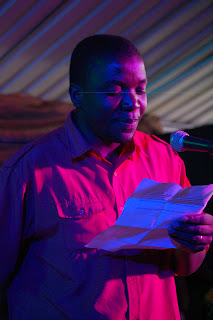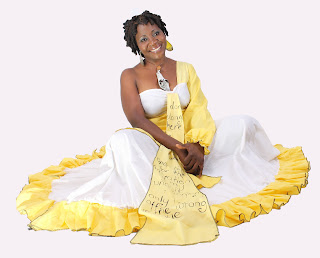Book Café, Harare, Saturday 28 April 2012
This end-of-April-weekend the world celebrates the first International Jazz Day ever.
In Paris, France, on 27 April, UNESCO Goodwill Ambassador Herbie Hancock will kick-off the first annual International Jazz Day with a full day of events featuring Marcus Miller, Barbara Hendricks, Hugh Masekela, Dee Dee Bridgewater, and more.
In New Orleans, USA, on 30 April, New Orleans Jazz & Heritage Festival Special sunrise concert with Dianne Reeves, Jeff 'Tain' Watts, Terence Blanchard, Ellis Marsalis, Kermit Ruffins, and other special guests.
In New York, USA, on 30 April, a special evening concert at the United Nations General Assembly Hall will feature Angelique Kidjo, Wynton Marsalis, Hugh Masekela, Shankar Mahadevan, and many more.
In Harare, Zimbabwe, on Saturday 28 April 2012 from 3-7pm, the Book Café presents “JAZZ UNITED” a daytime jazz concert featuring some of Zimbabwe’s top and budding jazz artists. Pamberi Trust and its jazz development programme join hands with AWIPAZ and the world to celebrate jazz in Zimbabwe and to raise awareness on the UNESCO 2005 Convention on the Protection and Promotion of the Diversity of Cultural Expressions.
The afternoon event is an initiative of the Association of Women in the Performing Arts (AWIPAZ) which will present some of Zimbabwe’s leading women in jazz in an exciting line-up including Dudu Manhenga, Prudence Katomeni, Bernie Bismark, Patience Musa, Rute Mbangwa and Hope Masike, with best-loved groups Jazz Invitation, Color Blu, Hope Masike's trio, and the emerging Sunsets. Instrumentalists who are being invited to sit-in are Filbert Marova and Tich Makalisa (keyb), guitarists Jimmy Buzuzi and Pablo Nakappa, and Richie Lopes (sax), and there will be a hot jam session including many others.
The Sat 28 April event for International Jazz Day is supported in part by UNESCO, and is likely to be hot and happening, and creating a stir for jazz again in the capital. Oh Happy Day!
"International Jazz Day”
In November 2011 during the UNESCO General Conference, the international community proclaimed 30 April as "International Jazz Day". UNESCO regards jazz as an art-form that has contributed to the promotion of intercultural dialogue, eradication of discrimination, promotion of respect for human rights and human dignity and fostering gender equality and reinforcement of the role of youth for social change.
The Day is intended to raise awareness in the international community of the virtues of jazz as an educational tool, and a force for peace, unity, dialogue and enhanced cooperation among people. It will bring together communities, schools and other groups all over the world to celebrate and learn more about the art of jazz, its roots and its impact and to highlight its important role as a means of communication that transcends differences.
Around the world many governments, civil society organizations, educational institutions, and private citizens currently engaged in the promotion of jazz music will embrace the opportunity to foster greater appreciation not only for the music but also for the contribution it can make to building more inclusive societies.
Jazz in Zimbabwe: Background
Jazz has a fascinating history in Zimbabwe. Zimbabwe has had a profound influence on “African jazz” with such luminaries as Dorothy Masuka, The Cool Crooners, saxophonists Simangaliso Tutani and Albert Musarurwa, trumpeter Paul Lunga, pianists Chris Chabuka, guitarists Robert Moore, Louis Mhlanga and David Ndoro, drummer Jethro Shasha and bassist Bryan Paul, who were the jazz heroes of the struggles of that time, who reached audiences beyond our borders. Many more were performing locally and in the ‘township’ arena.
In more recent years a new generation of powerful jazz artists has emerged – singer/songwriters Dudu Manhenga, Prudence Katomene-Mbofana, Miriam Mandipira, Hope Masike, pianists Bernie Bismark, Filbert Marova and Tich Makalisa, drummers Sam Mataure and Blessing Muparutsa, bassist Kelly Rusike. All are well known and acclaimed in Zimbabwe, and have also toured in the region and internationally. Many, many more perform at home, some struggling for the love of jazz.
In spite of this rich pool of jazz talent, the market is not strong, and many former jazz venues in the capital have branched out into other genres in order to survive. The jazz platform is therefore threatened, and every effort must be made to defend jazz platforms, promote its rich music culture of diversity and its artists.
Pamberi Trust opened the Mannenberg Jazz Club in 2000 with a performance by the famed South African jazz pianist Abdullah Ebrahim, and maintained a high profile for jazz until it’s merge with the Book Café in new premises at 139 S.Machel avenue in April 2012. In October 2011, Pamberi Trust partnered with the National Arts Council of Zimbabwe and Embassy of Italy in the October International Jazz Festival, which will be back on the cards this October.
The International Day of Jazz is welcomed in Zimbabwe. The new Book Café will be making sure that it’s jazz tradition continues to burn strongly with a new drive to gather jazz-lovers together for the enjoyment of jazz – wherever it may be.
Penny Yon
Pamberi Trust
April 2012



















